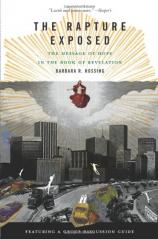Excerpt
Excerpt
The Rapture Exposed: The Message of Hope in the Book of Revelation

The Invention of the Rapture
TEN-YEAR-OLD "JOSH" CAME HOME from school to an empty house. His mother, normally at home to greet him, was nowhere to be found. She might have been at the store or at a neighbor's, but Josh was terrified. His immediate response was a terrible fear that all his family had been "Raptured" without him. Josh was sure he had been left behind.
Now a grown-up in my seminary class on the book of Revelation, Josh told this story of his boyhood experience. Others consistently echo his story of childhood fear of the Rapture. These born-again Christian children were exhorted to be good so that they would be sure to be snatched up to heaven with Jesus when he returned. Raised on a daily diet of fear, their view of God resembled the song about Santa Claus coming to town: "You'd better watch out, you'd better not cry." Only it was Jesus, not Santa, who was "coming to town" at an unexpected hour: "He knows when you've been sleeping. He knows when you're awake. He knows if you've been bad or good, so be good for goodness sake."
Christian camp songs taught children to count down to the Rapture like a space launch:
Ten and nine, eight and seven, six and five and four;
Call upon the Savior while you may.
Three and two, coming through the clouds in bright array.
The countdown's getting closer every day.
The Presbyterian pastor who shared this song with me experienced an unexpected and disturbing flashback to his childhood fears even as he sang the words. Visibly shaken after one of my talks on the Rapture, he was experiencing real panic: "I thought I was over the Rapture trauma, but I guess I'm not."
All this fervor and fear over the Rapture-a principle invented only 170 years ago-for a word that cannot even be found in the Bible.
The countdown image perfectly expresses the theology of the Rapture and the end-times. Christian end-times movies have been marketed as thrillers. A Thief in the Night, from 1972, is described as "the most popular end-times movie ever produced, with over 300,000,000 viewers." The heroine "disregards prophetic biblical warnings and the truth begins to unfold. Can she escape the dramatic, haunting circumstances? Is there a way out? The climax is riveting!"
Cloud Ten Pictures' trilogy, Apocalypse, Revelation, and Tribulation, employed real Hollywood stars Gary Busey, Margot Kidder, and Corbin Bernsen. And most recently the movie version of Left Behind (2000), by LaHaye and Jerry Jenkins, created a huge buzz in the Christian media, but was roundly scorned by mainstream reviewers.
In every depiction the Rapture divides families. Terrified parents on airplanes scream, "My babies, my babies," as the camera cuts to teddy bears and diapers left behind on the seats. All children under age twelve disappear. Babies are sucked out of pregnant women's wombs as stupefied fathers watch the ultrasound machines go blank. Planes and cars crash in fireballs. Media reports come in from around the country: "Trains were involved in head-ons with lots of death."1 God had Raptured the engineers before they had time to apply the brakes.
Does the Bible really teach that Jesus will come to snatch Christians off the earth, causing "lots of death," before inaugurating a seven-year period of tribulation? The Rapture has become embedded in American Christian culture today, but the idea of the Rapture is less than two hundred years old.
No specific passage in the Bible uses the word "Rapture." Even today's most famous Rapture proponents, LaHaye and Lindsey, admit that. Nor does the Bible clearly lay out their version of God's prophetic timetable. Details "must be pieced together from various passages of Scripture," explains LaHaye in his 2002 book The Rapture: Who Will Face the Tribulation? LaHaye is the theological brains behind the Left Behind novels, the plots of which are written by Jenkins. LaHaye has written numerous books about the end-times and is a long-time leader in right-wing Christian political causes along with his wife, Beverly.
Most Christian churches and biblical scholars condemn Rapture theology as a distortion of Christian faith with little biblical basis. Critics represent the whole spectrum of churches, from conservative Missouri Synod Lutherans to evangelicals, to Roman Catholics, and liberal Presbyterians. Many evangelical churches and leaders oppose the notion of the Rapture, pointing out that it is a recent and idiosyncratic development in Christian teaching. But institutional criticism is essentially irrelevant. It is through popular televangelists and writings such as Lindsey's The Late Great Planet Earth and the more recent Left Behind novels that the Rapture storyline has become central to so many Americans' understanding of the Bible and Christian faith.
Excerpted from THE RAPTURE EXPOSED © Copyright 2005 by Barbara R. Rossing. Reprinted with permission by Basic Books. All rights reserved.
The Rapture Exposed: The Message of Hope in the Book of Revelation
- Genres: Christian, Religion, Spirituality
- paperback: 240 pages
- Publisher: Basic Books
- ISBN-10: 0813343143
- ISBN-13: 9780813343143







